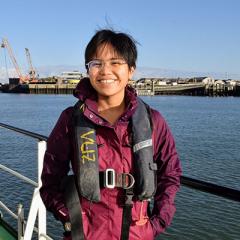In 2023, 112 nations came together and agreed on the need to conserve and effectively manage areas beyond the national jurisdictions of countries, the “high seas”. This historic document, the Biodiversity Beyond National Jurisdiction (BBNJ) treaty, has been agreed upon and, once ratified, will provide a mechanism to conserve more than 60% of the global oceans. To put the BBNJ agreement into force, 60 countries need to ratify the agreement.
On 18–19 February 2025, CBCS PhD candidate Tin Buenafe and CBCS Director Associate Professor Daniel Dunn attended the BBNJ symposium in Singapore hosted by Singapore’s Ministry of Foreign Affairs and the Centre for International Law at the National University of Singapore. The venue for this second BBNJ symposium was apt, given that Ambassador Rena Lee from Singapore championed finishing the text of the BBNJ agreement after gruelling negotiations in the sessions of the Intergovernmental Conference on the BBNJ.

Image credit: Ana Colaço.
The symposium’s main objective was to continue the momentum leading up to the ratification of the BBNJ agreement. Delegates from various countries were in attendance, primarily from the Asia–Pacific region. The symposium was structured around discussions between panellists from different sectors. These ranged from lawyers and policy-makers talking about the challenges and opportunities around
the legislation and regulation of environmental impact assessments and marine genetic resources to the co-chairs of the BBNJ Preparatory Commission detailing the priorities that need to be addressed by the Commission to provide more structure on the modalities surrounding the BBNJ agreement.
“In a hall full of attendees, probably less than 10% were scientists. Attending this symposium and immersing myself in the policies surrounding the conservation and use of the high seas was very valuable for my research”, says Tin.
“My work focuses on developing tools that explicitly incorporate climate change into conservation planning work in the high seas. This symposium presented many opportunities for conservation scientists to influence how the BBNJ agreement – when put into force – can and should serve as the backbone to conserve and sustainably use resources in the high seas.” The BBNJ agreement has only been ratified by 21 nations and, as such, has not yet been put into force. Many nations are only starting to come together to push for the conservation and sustainable use of the high seas. Despite the current malleable nature of the BBNJ agreement, Tin remains hopeful.

Image credit: Tin Buenafe.
“There is so much work to do – from the delegates pushing for different agendas and promoting advocacies, through policy-makers shaping the modalities and contexts of the agreement across the different pillars of the agreement, to the scientists who make sure that science is integrated in decision-making every step of the way. As a marine conservation scientist championing climate-smart conservation planning, my hope is to continue to contribute to the ongoing discussions that shape the conservation and management of the high seas. As a human being, my hope is for the BBNJ agreement – which is only made possible by transboundary cooperation and collaboration – to continue being a beacon of hope in our increasingly divided world.”
To keep up to date on our latest events, check out our Bluesky and LinkedIn.

